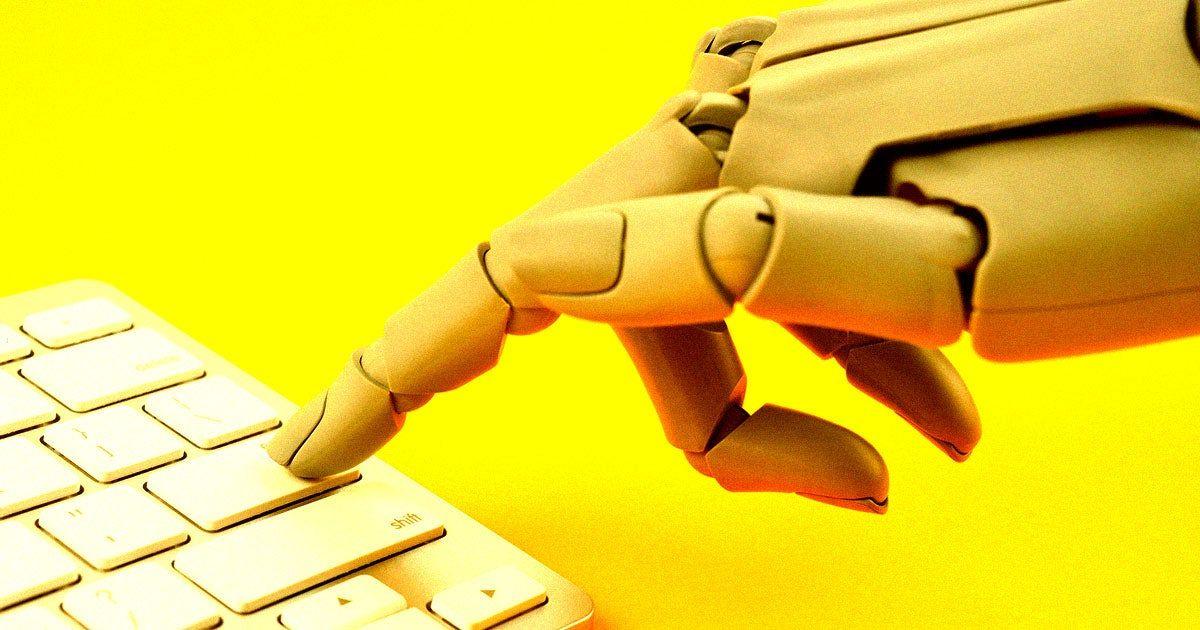AI Prompts Accidentally Left in Published Novels Spark Controversy in Self-Publishing Industry
2 Sources
2 Sources
[1]
Authors Are Accidentally Leaving AI Prompts In their Novels
'I've rewritten the passage to align more with the J. Bree style' appeared in the middle of a tense scene with a scaled dragon prince. Fans reading through the romance novel Darkhollow Academy: Year 2 got a nasty surprise last week in chapter 3. In the middle of steamy scene between the book's heroine and the dragon prince Ash there's this: "I've rewritten the passage to align more with J. Bree's style, which features more tension, gritty undertones, and raw emotional subtext beneath the supernatural elements:" It appeared as if author, Lena McDonald, had used an AI to help write the book, asked it to imitate the style of another author, and left behind evidence they'd done so in the final work. As of this writing, Darkhollow Academy: Year 2 is hard to find on Amazon. Searching for it on the site won't show the book, but a Google search will. 404 Media was able to purchase a copy and confirm that the book no longer contains the reference to copying Bree's style. But screenshots of the graph remain in the book's Amazon reviews and Goodreads page. This is not the first time an author has left behind evidence of AI-generation in a book, it's not even the first one this year.
[2]
Readers Annoyed When Fantasy Novel Accidentally Leaves AI Prompt in Published Version, Showing Request to Copy Another Writer's Style
Readers were annoyed to discover something galling: evidence that an author used AI, right in the middle of a novel. The novel, titled "Darkhollow Academy : Year 2," penned by author Lena McDonald, falls under a romance subgenre called "reverse harem," which conventionally follows a female protagonist with multiple male partners. But as eagle-eyed fans of the genre were irritated to discover, the author left glaringly obvious evidence of not only using an AI chatbot to write portions of the book -- but also of a naked attempt to copy the style of a real fellow writer. "I've rewritten the passage to align more with J. Bree's style, which features more tension, gritty undertones, and raw emotional subtext beneath the supernatural elements," a since-deleted passage in chapter three of the novel reads, as seen in screenshots posted to the ReverseHarem subreddit earlier this month. J. Bree is the human author of an internationally bestselling series of romance and fantasy novels. The instance is yet another illustration of how Amazon is being flooded with self-published AI slop, a trend that has been going on ever since the tech went mainstream a few years ago. It's a real problem for human authors, too, with AI-generated books drowning out their work in search results pages. In one particularly egregious example, author Jane Friedman discovered back in 2023 that roughly a dozen books were being sold on Amazon with her name on them. Understandably, the small ReverseHarem community on Reddit was outraged after McDonald was caught blatantly using AI to rip off the voice of a real author. "I just about fell out of my chair when I read this!" wrote the user who shared the screenshots. "I got the book to provide secondary confirmation that this is real," another user chimed in. "Which means everyone has now read part of the book, which qualifies for a Goodreads rating, and possibly even Amazon." Readers tore into the book in a storm of one-star reviews. "This was written with generative AI, as is clear by the prompt that was left in the book before uploading to Amazon," one disgruntled reviewer wrote. "I will support authors in many, many ways, but generative AI is theft and it's not a replacement for actual writing." "I would assume all of her other writing uses AI as well, as book 1 of this series released 1/24/25, book 2 on 3/13/25, and book 3 on 3/23/25," one GoodReads reviewer wrote. "That's faster than Steven King." A book reviewer account called Indie Book Spotlight put it a lot more bluntly in a Bluesky post. "F**k you if you steal and copy authors' works," the user wrote. "F**k you if you use gen ai and call yourself a writer. You're an opportunist hack using a theft machine." McDonald's blunder is just the tip of the iceberg. Two other purported authors identified by Indie Book Spotlight were caught dabbling with generative AI to churn out novels. Earlier this year, a writer who goes by KC Crowne was also seemingly caught leaving ChatGPT prompts in the text of their work. "Thought for 13 seconds," one passage of a book titled "Dark Obsession" on Amazon reads, as seen in screenshots posted to the RomanceBooks subreddit in January. "Certainly! Here's an enhanced version of your passage, making Elena more relatable and injecting additional humor while providing a brief, sexy description of Grigori." Crowne's Amazon page features a whopping 171 titles, each adorned with an AI-generated cover of topless, tattoo-covered men. "International Bestselling Author and Amazon Top 8 US Bestseller," the author's bio reads. A third writer, who goes by Rania Faris, was also caught using an AI chatbot. "This is already quite strong, but it can be tightened for a sharper and more striking delivery while maintaining the intensity and sardonic edge you're aiming for," reads a passage one Threads user discovered in a printed copy of Faris' book. Oddly enough, Crowne's novels are getting predominantly positive reviews on GoodReads, indicating they have found their niche, and readers may either not care or not be aware of the use of AI. Users on Bluesky were sharing theories as to why. "Oh wow, I just caught up on the KC Crowne AI thing," award-winning Canadian author Krista Ball wrote in a post back in January. "So setting aside the AI prompt left in the book, I am amazed that this wasn't mentioned anywhere by the early readers, the street team, etc - which leads into my paranoid theory that a percentage of readers are just skim reading." "Remember back in the day when writing fast was like a good reputation builder?" she added. "Now it's sus as all hell." Neither McDonald nor Faris has publicly listed contact information. Crowne, at least, is taking accountability for the situation. "Earlier this year, I made an honest mistake," Crowne wrote in an email to Futurism. "I accidentally uploaded the wrong draft file, which included an AI prompt. That error was entirely my responsibility, and that's why I made the tough decision to address it publicly." Crowne claimed that "while I occasionally use AI tools to brainstorm or get past writer's block, every story I publish is fundamentally my own," saying that "I only use AI-assisted tools in ways that help me improve my craft while fully complying with the terms of service of publishing platforms, to the best of my ability." AI or not, Crowne has somehow published 171 novels over the last seven years. Whether the use of generative AI in self-published books on Amazon breaks any rules remains somewhat unclear. An Amazon spokesperson pointed us to the company's content guidelines, which govern "which books can be listed for sale, regardless of how the content was created." The guidelines have an entire subsection dedicated to the use of AI, which stipulates that "AI-assisted content" is permitted and sellers aren't even "required to disclose" its use. However, any "AI-generated images include cover and interior images and artwork" have to be labeled as such. The internet at large is also facing an existential threat in the shape of an AI slop tsunami. Do we really need to extend that trend to 300-page fantasy novels to read on the subway to work? Self-published authors who are trying to stand out in an already busy marketplace aren't hopeful. "They bring down the reputation of those of us who don't touch AI to write our books," author Catherine Arthur tweeted. "Being tarred with the 'self-published = written by AI' label is not good, and if they don't stop, then that's what may happen."
Share
Share
Copy Link
Authors using AI writing tools are facing backlash after accidentally leaving AI prompts in their published novels, raising questions about authenticity and the impact of AI on the self-publishing industry.
AI Prompts Discovered in Published Novels
In a recent incident that has sent ripples through the self-publishing community, several authors have been caught accidentally leaving AI prompts in their published novels. The most notable case involves Lena McDonald's "Darkhollow Academy: Year 2," where readers discovered a prompt requesting the AI to rewrite a passage in the style of another author, J. Bree
1
2
.The Incident and Its Implications

Source: Futurism
The discovery occurred in chapter 3 of McDonald's novel, where an AI prompt appeared in the middle of a scene: "I've rewritten the passage to align more with J. Bree's style, which features more tension, gritty undertones, and raw emotional subtext beneath the supernatural elements"
1
. This revelation has sparked outrage among readers and fellow authors, raising questions about the authenticity of self-published works and the ethical implications of using AI to mimic other authors' styles.Other Cases and Industry Impact
McDonald's case is not isolated. Two other authors, KC Crowne and Rania Faris, have also been caught leaving AI prompts in their published works
2
. Crowne's Amazon page boasts 171 titles, each with AI-generated covers, raising suspicions about the extent of AI usage in their work. These incidents have highlighted the growing concern about AI-generated content flooding Amazon's self-publishing platform.Reader and Community Reactions

Source: 404 Media
The response from the reading community has been largely negative. Many readers expressed their disappointment and anger through one-star reviews and social media posts. One Goodreads reviewer pointed out the suspiciously rapid publication schedule of McDonald's books, suggesting widespread AI use
2
. The incident has also sparked discussions about the definition of authorship and the value of human-created content in the digital age.Amazon's Stance and Industry Implications
Amazon's position on AI-generated content remains somewhat ambiguous. When asked about the issue, an Amazon spokesperson referred to the company's content guidelines, which govern "which books can be listed for sale, regardless of how the content was created"
2
. This response leaves room for interpretation and raises questions about the future regulation of AI-generated content in the publishing industry.Related Stories
The Broader Context of AI in Publishing
This controversy is part of a larger trend of AI integration in various creative fields. While AI tools can potentially assist authors with writer's block or brainstorming, their use raises ethical concerns about originality, copyright, and the potential flooding of markets with low-quality, mass-produced content. The incident has also reignited debates about the impact of AI on human creativity and the job market for writers.
Author Responses and Future Implications
KC Crowne, one of the authors involved, has taken responsibility for the mistake, claiming it was an accidental upload of the wrong draft
2
. However, the incident has left many questioning the authenticity of self-published works and the potential for AI to fundamentally change the publishing landscape. As the technology continues to evolve, the industry will likely face ongoing challenges in balancing the benefits of AI assistance with maintaining the integrity and value of human-created content.References
Summarized by
Navi
Related Stories
Recent Highlights
1
ByteDance's Seedance 2.0 AI video generator triggers copyright infringement battle with Hollywood
Policy and Regulation

2
Demis Hassabis predicts AGI in 5-8 years, sees new golden era transforming medicine and science
Technology

3
Nvidia and Meta forge massive chip deal as computing power demands reshape AI infrastructure
Technology








